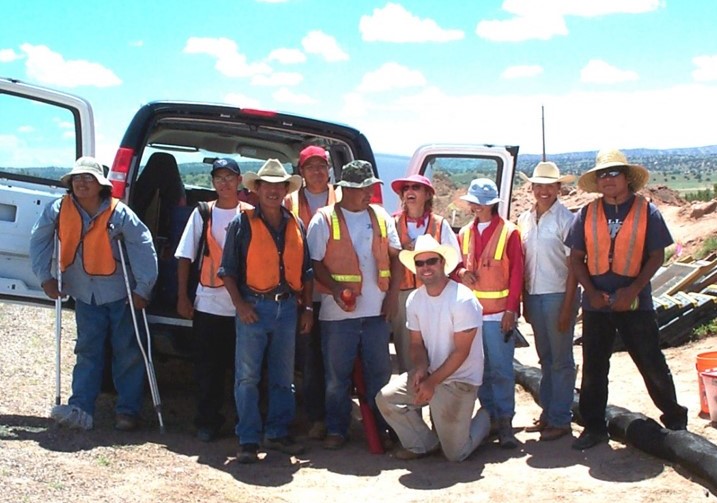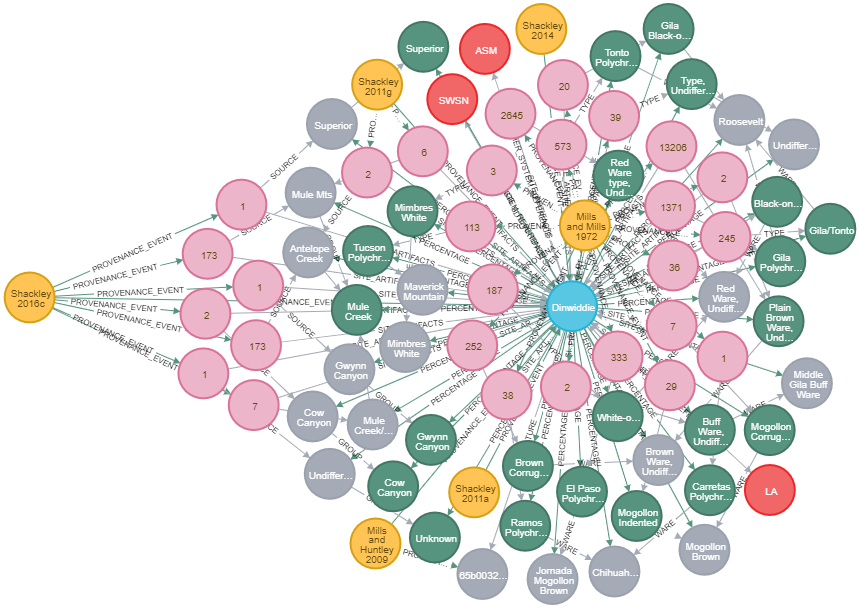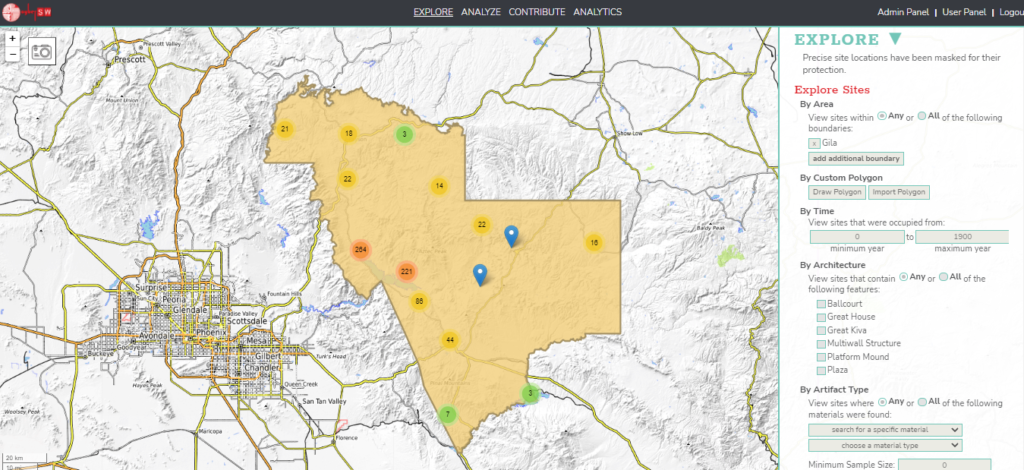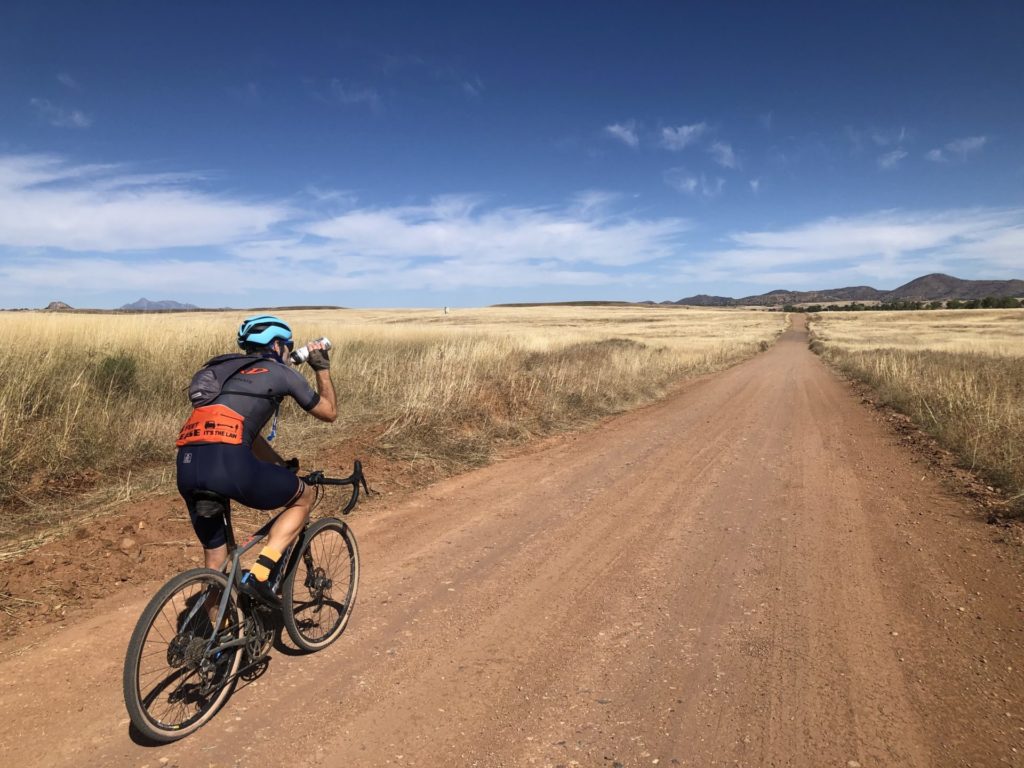- Home
- >
- Preservation Archaeology Blog
- >
- On Archaeology: Joshua Watts
Last Saturday, October 16, was International Archaeology Day. This annual event is organized by the Archaeological Institute of America, and there are a lot of great events and activities to choose from.
When we can, we like to commemorate IAD with a blog series. This year, several members of our staff are responding to questions about how they got into archaeology, what they thought the field was, how they think about it now—and even what they think archaeology should be.
We’ll have a new post almost every Friday through the end of the year. Next up, Joshua Watts.

(October 22, 2021)—For me, why am I in archaeology is not as interesting as how did I get here.
I’ll explain.
In short: I first started out volunteering with the Center for Desert Archaeology (an earlier incarnation of Archaeology Southwest) in the late 1990s as a college student. Specifically, I was working on a creative writing degree at the University of Arizona (yay, poetry!) and found myself enjoying the introductory anthropology and archaeology courses. Ended up volunteering with one of the first (maybe the first?) Preservation Fellows on some survey fieldwork along Cienega Creek southeast of Tucson—and came to realize that there was a JOB that you could get PAID for doing that basically involved hiking around in staggeringly beautiful desert landscapes trying to find the coolest stuff (like Archaic projectile points and such).
It seemed insane—but maybe marginally less insane than imagining myself as a career poet?
So I took more classes and did more fieldwork and developed a taste for the abuse (physical and mental) of doing CRM (cultural resource management) during Arizona summers. The path toward a career in archaeology, with a focus on fairly traditional survey and excavation work, seemed clear-ish at that point.

Over the next… several years… I did a lot of fieldwork and pursued a grad degree (and made the shift from UA to ASU, which is a lot to explain to folks now that I’m back in Tucson). I eventually focused on big-picture problems/topics in human societies (for example, my dissertation was on the origins and evolution of market-based economies, with the Phoenix Basin Hohokam as a case study). I was a moderately ambitious student, did good-but-not-great in my classes, and enjoyed teaching. But, for a while at least, I was convinced I would end up back in the desert doing the fieldwork that attracted me to the discipline in the first place.
After, you know, earning a Ph.D., I thought I knew what archaeology was… but pinning down a working definition of the discipline reminds me a bit too much of Charlie Brown missing his kick at the football—again and again—as Lucy pulls it out of the way.
Let’s just say that, based on my experience in school at the turn of the millennium, archaeology in my mind is a field of inquiry primarily focused on studying traces of past human activity—settlements, artifacts, and the like—to better understand what happened in the past AND how patterns of behavior in the past may be relevant to understanding human societies in the present or future, or both.
Basically, at the highest level, archaeologists have unique datasets to objectively (okay, arguably) document what human societies actually do over very long temporal scales. Which is often quite different from, but not unrelated to, the stories humans tell themselves about how they behaved through time. There are, OF COURSE, many different perspectives on how to interpret the data and how best to use what we learn in our research to effect positive change in the modern world.
I would be way out over my skis to say much more about this than what I’ve offered in the previous three paragraphs. The trend in the discipline—primarily in North America and some other post-colonial contexts—is toward a much more political, narrow archaeology where researchers are more actively engaged in righting past wrongs and power dynamics in the region(s) where they work.
I haven’t entirely made up my mind about how I feel about this. It’s well-intentioned and I am mostly on board, but I am concerned that by moving away from what we’re good at (see previous paragraphs) toward… something important but pretty different… that we risk making the field even less broadly relevant than it already is.
As you can perhaps tell by now, talking or writing about this makes me squeamish. I’m a retired poet, after all, and words are important to me—so I fully appreciate that on this topic, it’s awfully easy to say the wrong thing.
Maybe you can see where this is going. On my own career path, by the 2010s, I found it increasingly difficult to reconcile my specific research interests with a discipline that relies almost entirely on the material culture of people whose living descendants often don’t want or need us (white middle-aged male academics) studying those items/places to answer questions they’re not particularly interested in. Truth be had, long before I finished my degree I had one foot out the door from anything resembling traditional archaeology as practiced in the Southwest. I was much more focused on preservation and repurposing of existing datasets, including working for a time on the tDAR project (https://core.tdar.org/). Or writing code to scrape an enormous amount of messy census and patent data off a website for an economics professor. That sort of thing.

At the same time, I was realizing that sleeping in your own bed (instead of a cot in the woods, or some one-star motel on a remote CRM job) and working at a desk in an air-conditioned room (instead of long summer field seasons) has some appeal once you survive your twenties. Writing code and managing databases left me with a little more time and energy for hobbies—I now race road bicycles, sometimes perform in rock bands. Things like work-life balance and managing my physical and mental health got more important to me as I (finally) finished up my degree in 2013.
The skills I had picked up during grad school (particularly computational modeling and simulation, and related experience with high-performance computing) ended up being MUCH more relevant on the job market than any line on my résumé about Hohokam pottery. So I ended up in a postdoctoral research position working on the much less ethically… complicated… topic of modeling hurricane evacuations in the 21st century. I helped a team of atmospheric scientists wrestle with the “social science problem” of communicating risk to households and communities in vulnerable locations.
Basically, I was still doing social science (with a computational angle) and with a focus on big-picture problems in human societies… but working with meteorologists and other natural scientists totally comfortable in their topic and their importance to the world in a way that very, very few archaeologists of my generation would ever be.
That postdoc evolved into a research professor position at ASU in Research Computing where I helped support faculty and students in the social sciences who needed access to high-performance cluster computing and approaches to computational modeling and analyzing truly big datasets. Which was pretty interesting work, really, but at that point I had been at ASU in one role or another for… around 19 (!) years.
Almost three years ago, a friend sent me a job posting by Archaeology Southwest—the same core group of people I’d gotten my start with over two decades earlier. The position was a mix of digital data management (the cyberSW science gateway), and a chance to re-engage in the preservation-focused archaeological research that still interested me. The opportunity to return to Tucson and get back to working with the Archaeology Southwest crew (and their collaborators) was too good to pass up.

Ethically, it’s still complicated and occasionally uncomfortable. But the preservation focus and frequent renegotiations about what our role in the discipline is and should be is a healthy approach.
So, really, the answer to Why am in archaeology is mostly a function of this work being the most interesting stuff I’m qualified to do that also provides a semblance of stability that my more artistic lifelong loves (writing, music) probably wouldn’t have offered me. It turns out the gravity well of Tucson and Archaeology Southwest are hard to escape, but it totally suits me. The complex, messy problems that emerge in human societies are fascinating—and the long time-depth perspective from archaeology is highly relevant to how we make better decisions going into the future. I’m here to engage in and facilitate research from that angle.
Whether that approach is consistent with what archaeology IS and OUGHT to be… well, I’ve been at this for more than two decades and feel less qualified than ever to argue that with any confidence.

One thought on “On Archaeology: Joshua Watts”
Comments are closed.
Hi Joshua! As a non-archaeologist that finds myself tiptoeing into this unique realm, I found this blog post to be enlightening and weirdly validating about the…feelings?! that I have happening inside me as I sit across the table from Dr. Chris Nicholson, etc and all of your old friends at the Center for Digital Antiquity (tDAR) at ASU! I’m the new business development/marketing/operational program manager for the CDA, and I am going to share the link to this awesome post on our social channels….not just because of the mention, which I know we appreciate, but because it’s a really honest, nice read! Cheers and hope to interface with you sometime soon, in person!